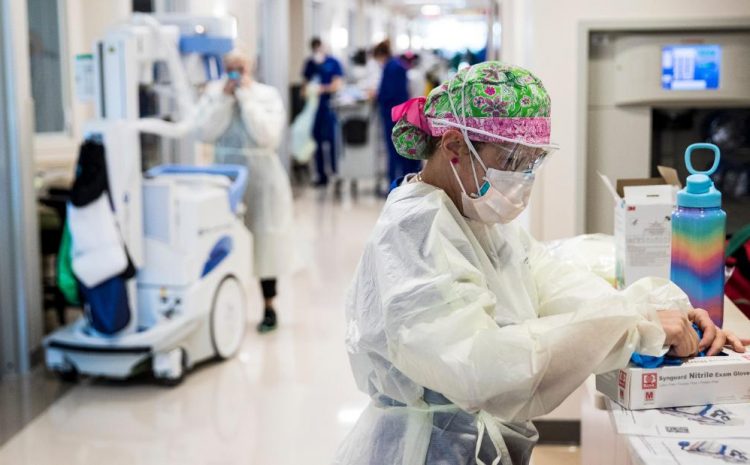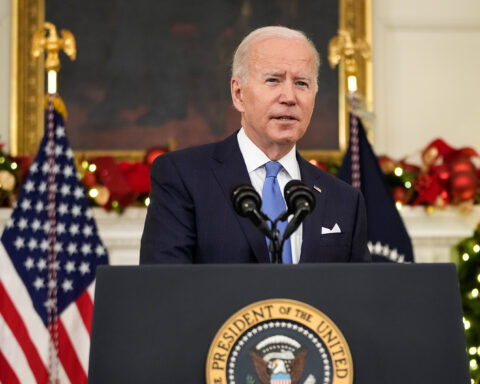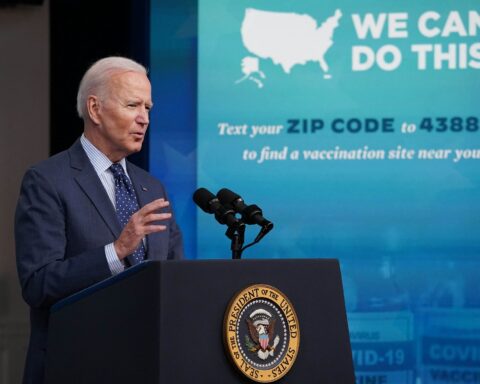As US government officials prepare to brief the public about Covid-19 vaccine booster shots, there is an emerging consensus coming from influential corners of the national news media: people should anticipate that Covid-19 is here to stay. It’s time to adjust expectations accordingly.
While some countries are still pursuing a “Covid zero” strategy, the United States clearly is not. The goal should be — indeed, has to be — risk minimization, not risk elimination. The Atlantic’s homepage led with a headline that made this point on Tuesday: “The Coronavirus Is Here Forever. This Is How We Live With It.”
The word “endemic” is coming up in the coverage more often. Quartz ran an explainer on Tuesday. When a virus is no longer novel, and is a feature of life like the flu, it is endemic. This came up when STAT’s infectious diseases reporter Helen Branswell surveyed three dozen experts about their own risk tolerance amid the summer surge. Citing Johns Hopkins scholar Dr. Amesh Adalja, she wrote “he (and others) believe Covid is going to become endemic — we’re going to have to learn to live with it. For fully vaccinated people, Adalja said, the risks even from contracting Covid are pretty low.”
This reality is becoming a part of corporate calculations, as well. I noticed that Jim Cummings, the chief HR officer for CNN’s parent WarnerMedia, brought it up in an internal memo last week. He said Warner is moving ahead with more office reopenings in September despite the surge. “Ultimately,” he wrote, “the bigger question for us and, indeed, the entire world is when and how we start to live with COVID as an endemic reality. Right now, we think the best way to address all of these considerations is to move forward as planned while doing everything we can to mitigate risk — and that, of course, first and foremost requires everyone in the office to be vaccinated. And it also includes the flexibility to work at home.”
This reality needs to be reflected in news coverage from top to bottom and left to right. “We need to think in terms of RELATIVE RISK REDUCTION,” Dr. Celine Gounder wrote in a Twitter thread on Tuesday. Relative risk reduction does not mean that the risk drops to zero. With the vaccines, for example, it means that the risk of winding up in the hospital is drastically reduced. “Vaccines aren’t an immunity on/off switch for individuals,” Gounder wrote. “Vaccines work additively & synergistically at a population level.”
So about those vaccines…
Biden will speak about Covid-19 vaccine booster shots Wednesday at 4:30pm ET. The White House’s Covid-19 team will also hold a briefing on the same subject. The booster boosting “will include details on the first data on waning immunity among the vaccinated inside the US,” Dr. Sanjay Gupta reports, citing a senior federal health official. “Top health officials have previously said they were closely monitoring such data from Israel and Europe, but had not yet seen evidence from the US supporting the need for a booster. That is expected to change” on Wednesday…
J&J recipients shouldn’t be cast aside
Oliver Darcy writes: “In the spring, many Americans listened to public health officials — and, frankly, medical analysts on cable news — and sought out the first available coronavirus vaccine. For millions, that was the Johnson & Johnson vaccine. But since then, these J&J recipients have been left in the dark about what to do amid the Delta surge and possibility of the vaccine’s waning efficacy. Amid all the talk of a third shot for those who received the mRNA vaccines, little discussion has been devoted to what these people should do. It’s important for news orgs to not treat this like a side issue, but a significant one given that a significant number of people received the shot. Journalists should represent the J&J recipients who want answers. Gov’t officials should be pressed on this. At a bare minimum they should be asked this: When will the gov’t have guidance for J&J recipients? This month? Next month? October? November? People deserve answers…”
“Finding a new, tolerable way to live with this virus”
That’s what all of this — the fights about masks, the frustration about vaccinations, the focus on ventilation, etcetera — is ultimately all about.
“The coronavirus is not something we can avoid forever; we have to prepare for the possibility that we will all get exposed one way or another,” Sarah Zhang wrote in The Atlantic story I cited up top. (To buttress her point, I assume I already have been exposed.) “With the flu, we as a society generally agree on the risk we were willing to tolerate,” Zhang wrote. “With Covid-19, we do not yet agree.”
The transition to “endemic” Covid is psychological in nature. Phrases like “tested positive” and “case counts” have to take on a different meaning, especially among the vaccinated. “When everyone has some immunity, a Covid-19 diagnosis becomes as routine as diagnosis of strep or flu — not good news, but not a reason for particular fear or worry or embarrassment either. That means unlearning a year of messaging,” she pointed out. The big takeaway from Zhang’s article: “Endemic Covid-19 means finding a new, tolerable way to live with this virus. It will feel strange for a while and then it will not. It will be normal.”





